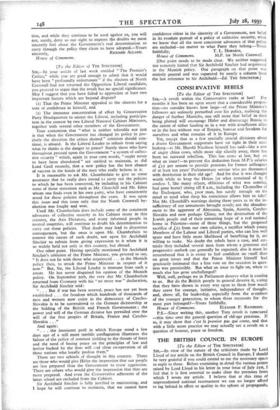[To the Editor of THE SPECTATOR] SIR,—In your article of
last week entitled "The Premier's Critics," while you are good enough to admit that it would have been "profoundly unfortunate" if the electors of North Cornwall had not returned the Opposition Liberal candidate, you proceed to argue that the result has no special significance. May I suggest that you have failed to appreciate at least two important factors which are beyond dispute?
(i) That the Prime Minister appealed to the electors for a vote of confidence in himself, and (2) The immense concentration of effort by Conservative Party Headquarters to unseat the Liberal, including participa- tion in the contest by two Liberal National Cabinet Ministers, together with several other members of the Government.
Your contention that "what is neither tolerable nor just is that when the Government has changed its policy in pre- cisely the direction the critics desired" criticism should con- tinue, is absurd. Is the Liberal Leader to refrain from saying what he thinks is the danger to peace? Surely those who have throughout pressed upon the Government "a system of collec- tive security" which, again in your own words, "ought never to have been abandoned" are entitled to maintain, as did Lord Cecil recently, that a new policy has the best chance of success in the hands of the men who really believe in it.
It is reasonable to ask Mr. Chamberlain to give us some assurance that he really does intend to carry out the policies to which he has been converted, by including in his Cabinet some of those statesmen such as Mr. Churchill and Mr. Eden whom one finds even in his own party, who have consistently stood for these policies throughout the years. It was upon this issue and this issue only that the North Cornwall by- election was fought and won.
Until Mr. Chamberlain does include some of the consistent advocates of collective security in his Cabinet many in this country, the Axis Dictators, and many informed people in neutral countries, will continue to doubt his determination to carry out these policies. That doubt may lead to disastrous consequences, but the onus is upon Mr. Chamberlain to remove the causes of such doubt, not upon Sir Archibald Sinclair to refrain from giving expression to it when it is so widely held not only in this country, but abroad.
One other point. Having specially mentioned Sir Archibald Sinclair's criticism of the Prime Minister, you proceed to say, "It does not lie with those who acquiesced . . . in the Munich policy then, to attack the Prime Minister in respect of it now." But, Sir, the Liberal Leader is immune from such a retort. He has never disguised his opinion of the Munich policy. On September 30th, the very day Mr. Chamberlain returned from Germany with his "no more war" declaration, Sir Archibald Sinclair said:
tt. . . But if war has been averted, peace has not yet been established . . . the freedom which hundreds of thousands of men and women now enjoy in the democracy of Czecho- Slovakia is to be surrendered to the German dictatorship at the bidding of the British and French Governments ; the power and will of the German dictator has prevailed over the will of the free peoples of Britain, France and Czecho- Slovakia . . ."
And again: . . . the imminent peril in which Europe stood a few days ago of a still more terrible conflagration illustrates the failure of the policy of constant yielding to the threats of force and the need of basing peace on the principles of law and justice backed by the firm will rod close co-operation of all those nations who loyally profess them."
There are two schools of thought in this country. There are those who would give Hitler the impression that our people are less prepared than the Government to resist aggression. There are others who would give the impression that they are more prepared. And even the Conservative adherents of the latter school are excluded from the Cabinet.
Sir Archibald Sinclair is fully justified in maintaining, and I hope he will continue to maintain, that we cannot have confidence either in the sincerity of a Government, nor belief in its resolute pursuit of a policy of collective security, when we know that all the most consistent advocates of that policy are excluded—no matter to what Party they belong.—Yours [One point needs to be made dear. We neither suggested nor remotely hinted that Sir Archibald Sinclair had acquiesced in the Munich policy. Our paragraph on that point was entirely general and was separated by nearly a column from the last reference to Sir Archibald.—Ed. THE SPECTATOR.]








































 Previous page
Previous page